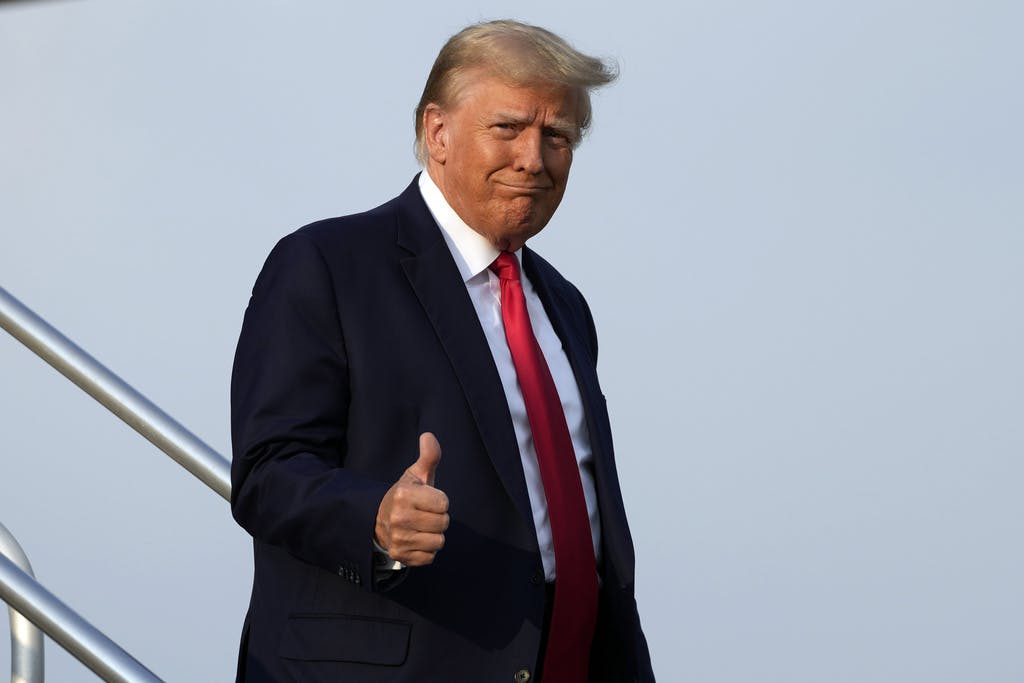World News – 2024 – Video Playlist | Video Playlists | Sites: | newsandtimes.org | links-newsandtimes.com | worldwebtimes.com | southcaucasusnews.com | russianworld.net | jossica.com | octobersurprise2016.org | bklyntimes.com | oceanavenuenews.com | fbireform.com | bloggersunite.net | octobersurprise-2024.org | Trump-News.org | Audio-Posts.com | Bklyn-NY.com | Posts Review – newsandtimes.org | Capitol-Riot.com |
The News And Times Review – NewsAndTimes.org
The justices brush aside Jack Smith’s apparent concern that Trump could be back in the White House before the case is done.
 President Trump steps off his plane at Hartsfield-Jackson Atlanta International Airport, August 24, 2023. AP/Alex Brandon
President Trump steps off his plane at Hartsfield-Jackson Atlanta International Airport, August 24, 2023. AP/Alex Brandon
The decision by the Supreme Court to reject Special Counsel Jack Smith’s extraordinary request for an expedited appeal on whether President Trump is immune from prosecution means that a trial date in March for the election interference charges appears increasingly unlikely.
The unsigned order, issued with no comment, telegraphs that the court prefers that Mr. Trump’s appeal work its way through the regular appellate course. The appeal concerns Judge Tanya Chutkan’s ruling that former presidents are not entitled to the protections of the office they once held.
Mr. Smith asked the court to issue a “judgment before certiorari,” a judgment that was once rarer than hen’s teeth but has become more common in recent years. Even the special counsel, though, acknowledges that such consideration would be an “extraordinary” departure as the Nine generally prefer to let cases mature down below before weighing them on the merits.
The high court’s ruling means that the immunity question now rests with the riders of the United Appeals Circuit for the Columbia District. Mr. Smith is asking that court, too, for an accelerated timeline. Should Mr. Trump lose before an appellate panel, he could request an en banc hearing, and then, potentially, the consideration of the justices. So despite the D.C. Circuit leaning left, the process could stretch for months.
The special counsel, who in a recent filing to the high court called this a “great constitutional moment,” has been emptying his prosecutorial toolbox to ensure that it blurs by. Now, it appears that Judge Chutkan’s trial date of March 4 is in jeopardy. Mr. Smith argues that Mr. Trump’s insistence on the regular course — a position now adopted by the justices — is “misguided” because the “charges here are of the utmost gravity.”
That significance alone, though, does not on its own necessitate moving at an accelerated pace. Every case the court considers is, in its own way, grave. Mr. Trump, though, wrote to the Supreme Court that “importance does not automatically necessitate speed.” He added that “If anything, the opposite is usually true. Novel, complex, sensitive and historic issues — such as the existence of presidential immunity from criminal prosecution for official acts — call for more careful deliberation, not less.”
In seeking a “resolution by conviction or acquittal, without undue delay,” Mr. Smith is telegraphing his focus on bringing the case to a verdict. Unsaid — but, at least to this correspondent, strongly implied — is the special counsel’s concern that should Mr. Trump be returned to the White House, and to assume the power of the executive branch, his case will be closed.
That concern appears to have been rejected — at least for now — by the justices declining to bestir themselves to accommodate Mr. Smith. Once the court of appeals rules, Mr. Trump will have 90 days to apply for the Supreme Court to reconsider his case. Mr. Smith hoped to short circuit this process, but now he must abide by a court-ordered more normal pace.
In his failed bid, Mr. Smith reminded the court that in a case from 1982, Nixon v. Fitzgerald, the Nine found that claims involving presidential immunity were deserving of “special solicitude” because of the implications for the presidency and, by extension, the entire architecture of separated powers. For the justices, that solicitude will now march to the beat of the tortoise rather than the sprint of the hare.

